
views
Considering the Problem

Think about your options. Consider if writing a letter to your principal is the best option to solve your specific problem. For some issues, there might be more effective ways to fix what’s wrong. For example, if you lost your coat on the playground, you should check in the office’s Lost and Found rather than addressing the issue in a letter to your principal. Before deciding to write a letter to your principal, ask yourself a few questions. Is this issue important enough to ask my principal about? Is there someone else who could help me with this problem? Can my principal do anything to help solve my problem? Other people who might be able to help you solve a problem include your parents, your teacher, the school secretary, and the school guidance counselor. If you can’t decide who would be the best person to ask, try making an appointment with your guidance counselor and ask their advice.

Take notes that define the problem. Whether you’re writing a letter to your principal about a bully, a difficult teacher, or a bad school policy, it is important to think about what the problem is and why it bothers you. You’ll need a clear understanding of the issue to write an effective letter. Make a list of reasons why you think the issue needs attention.

Consider the impact. In your notes, jot down ideas about why the issue affects you or people you know. For instance, perhaps you think there's not enough time to eat lunch. Flesh out why that is a hardship: you rush through your meal and never finish.
Writing Your Response
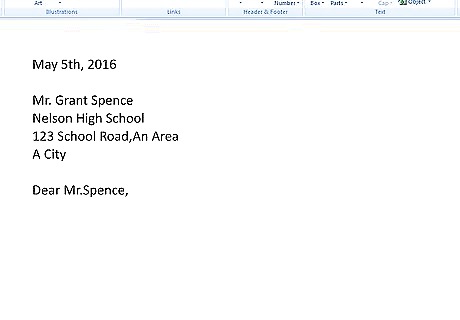
Begin writing a draft of the full letter. You can type your response on the computer or write it out by hand. The main goal here is to just start writing so that you have something to work with. You can revise and perfect it later.
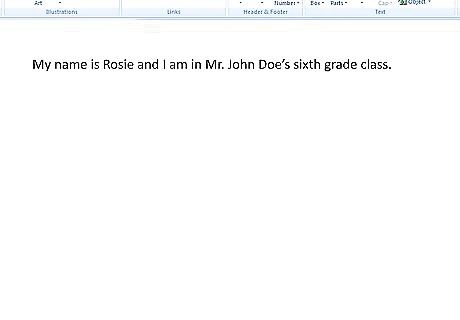
Introduce yourself. You need to let your principal know right way who wrote the letter he/she is reading. Begin with an introduction that identifies who you are and why you are writing to your principal. You can write something simple like, "My name is Sam Jones. I’m in the 8th grade, and I am upset about the short lunch period."
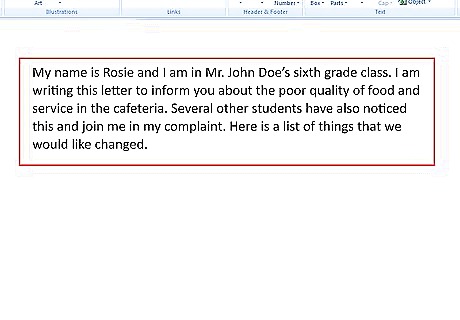
Identify the problem. The body of the letter should specify your complaint. This is where the gloves come off. Write in detail about the problem. Explain how it affects you or people you know.
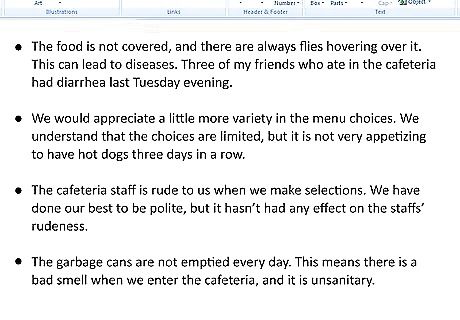
Address your desired outcome. What is the point of writing this letter? What action do you hope your principal will take when s/he reads your letter? This is your desired outcome. You need to be clear about what you hope will happen as a result of your letter being read. If you don’t tell your principal what you want to happen to fix the situation, they will think of their own solution and it might not be what you want. For example, if you are writing to tell your principal that your lunch period is too short for you to finish your meal, your desired outcome might be that they extend the lunch period by 5 minutes to allow more time for eating. Or maybe you could suggest that they allow additional bathroom breaks in the morning before lunch so that you don’t have to use your lunch time for a restroom break.
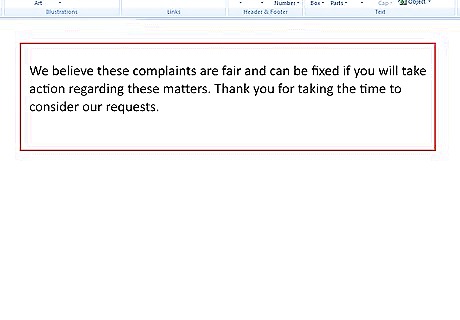
Close the letter clearly. Round off the letter by recapping the important points in a few lines. Ask the principal to arrange a meeting to discuss the issues raised in your letter. Sign your name and identify your homeroom so the principal can reply. Feel free to sign off your letter with a closer like "Regards" or "Thank you."
Revising Your Letter
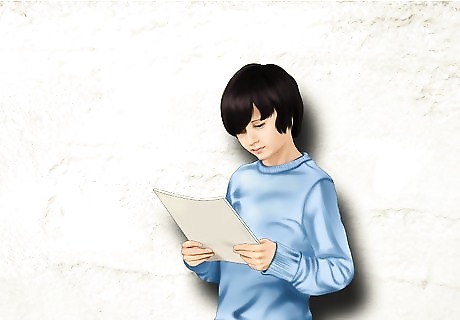
Review your draft and make changes to it. Correct the letter for a final version and make two copies, one to hand in and one for yourself. If you submit a handwritten letter, make certain it is legible. This may mean re-writing the letter once you have made all the corrections you want to make. Use your best handwriting for this letter.
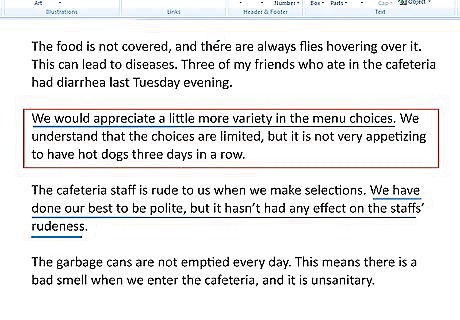
Use a positive tone. Your letter should be polite and mature. Remember that you are addressing your principal (who is kind of like your boss!) and you should address them in a respectful way. This is also important because people are usually more willing to help you if you ask them nicely instead of being rude or demanding. End your letter with "Thank you for your time " or "Thank you for your consideration" to keep things polite.
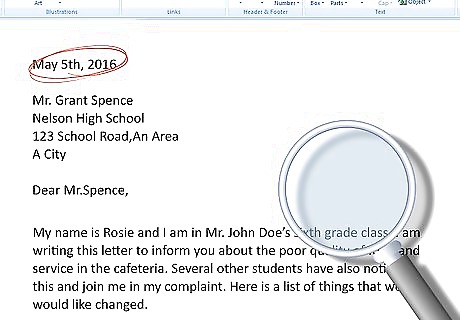
Pay attention to details. No matter the content, a sloppy letter with lots of mistakes will be taken less seriously than a well-written letter with very few mistakes. Be sure to avoid small mistakes in grammar and spelling – like spelling the recipient’s name correctly. You should also date the letter on the day you turn it over to your principal.
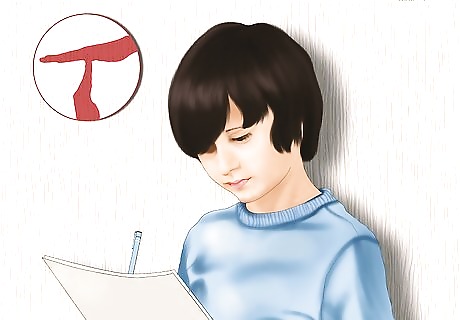
Take a break. When you are revising your letter, it can be helpful to step away from it for a few days so that you can see it with fresh eyes when you start working on it again. You will catch more mistakes and allow your brain some time to come up with more creative ideas.

Ask someone else to read your letter. Another person will usually be able to catch mistakes that you miss in your own work. After all, you wrote it, so you know what it’s supposed to say. It’s very easy to just skim over small mistakes because you know what you’re trying to say. An outsider can pay attention to what is actually on the page and spot errors you might have missed. Asking an adult to read your letter is a good idea because they will probably be able to help you correct any written mistakes you made and to look at more complex issues in your letter like the tone and the logical sequencing of your thoughts. Asking another student to read your letter would be good too because they can help you decide if your request is reasonable within the context of your school’s rules and regulations. They will have a good working knowledge of the situation since it is their school too. But they might not be as good at catching grammatical mistakes as an adult would be.
Following Up
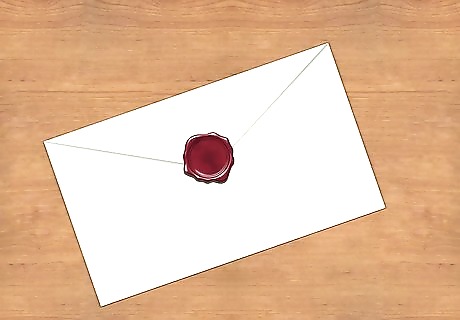
Deliver your letter. If possible, take it personally to your principal. If not, leave it with the school office or another teacher to pass it on. Make sure the letter is sealed inside the envelope before you leave.

Follow up verbally. Go to your principal’s office and ask him/her if they have received your letter. If you directly approach the principal s/he will probably be willing to talk. If you haven’t heard back from the principal in a week after you deliver your letter, set up an appointment with your principal to discuss the issue in person.
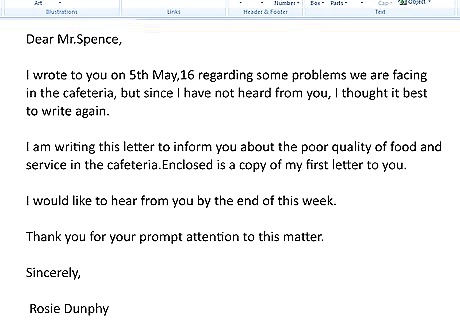
Follow up in writing. If you have not received a response in a week, follow up with a note asking for a response. You could also send your principal an email asking for confirmation that they have received your letter and requesting a timely response.

Keep copies for your records. You never know when you might need a copy of this letter again in the future, so make sure you keep a copy for yourself with your other valuable documents.


















Comments
0 comment